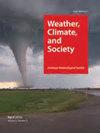Classifying Social Adaptation Practices to Heat Stress – Learning from Autonomous Adaptations in Two Small Towns in Germany
IF 1.9
4区 地球科学
Q3 ENVIRONMENTAL STUDIES
引用次数: 1
Abstract
Climate change adaptation planning and implementation have proliferated over the past years. However, we still lack an understanding of how society adapts itself outside of policy sectors and as part of what some refer to as “autonomous adaptation”. The way people respond to risk without deliberate interventions of public actors is not well-understood. Given the increasing occurrence of climatic changes that affect our daily lives, the topic is regaining attention with an emphasis on behavioral adaptation. This angle, however, does little to enhance our understanding of how society adapts collectively, and which practices and routines groups choose to adopt. This study investigates autonomous heat stress adaptation efforts in two small towns in Germany. Autonomous heat stress adaptation is approached through a lens of (social) adaptation practices. Small towns are understudied in adaptation research and have also played an only minor role when it comes to public adaptation planning, due to their lack of formal resources to develop public adaptation strategies. Based on empirical data, consisting of qualitative problem-centered interviews and a quantitative survey, concrete examples of (social) adaptation practices are identified and classified. The presented classification of practices goes beyond earlier attempts by generating insights on the role politics can play in providing a fruitful ground for enabling autonomous adaptation. The paper emphasizes the need for researchers and decision-makers to take a closer look at the wide variety of social adaptation practices already in place. This discloses insights on public-private adaptation mixes, which could ultimately also lift autonomous adaptation from its ad-hoc and reactive nature.对热应激的社会适应实践分类——从德国两个小城镇的自主适应中学习
过去几年,适应气候变化的规划和实施激增。然而,我们仍然不了解社会如何在政策部门之外自我适应,以及作为一些人所说的“自主适应”的一部分。人们在没有公共行为者刻意干预的情况下应对风险的方式还没有得到很好的理解。考虑到影响我们日常生活的气候变化越来越频繁,这一话题正在重新受到关注,并强调行为适应。然而,这个角度并不能增强我们对社会如何集体适应,以及群体选择采用哪些做法和惯例的理解。本研究调查了德国两个小城镇的自主热应激适应努力。自主热应激适应是通过(社会)适应实践的镜头来接近的。小城镇在适应研究中研究不足,在公共适应规划中也只发挥了较小的作用,因为它们缺乏制定公共适应战略的正式资源。本文基于定性问题访谈和定量调查的实证数据,对(社会)适应实践的具体案例进行了识别和分类。所提出的实践分类超越了先前的尝试,产生了对政治在为实现自主适应提供富有成效的基础方面可以发挥的作用的见解。这篇论文强调,研究人员和决策者需要更仔细地研究已经存在的各种各样的社会适应实践。这揭示了对公私适应组合的见解,这最终也可能使自主适应从其临时和反应性中解脱出来。
本文章由计算机程序翻译,如有差异,请以英文原文为准。
求助全文
约1分钟内获得全文
求助全文
来源期刊

Weather Climate and Society
METEOROLOGY & ATMOSPHERIC SCIENCES-
CiteScore
3.40
自引率
13.60%
发文量
95
审稿时长
>12 weeks
期刊介绍:
Weather, Climate, and Society (WCAS) publishes research that encompasses economics, policy analysis, political science, history, and institutional, social, and behavioral scholarship relating to weather and climate, including climate change. Contributions must include original social science research, evidence-based analysis, and relevance to the interactions of weather and climate with society.
 求助内容:
求助内容: 应助结果提醒方式:
应助结果提醒方式:


